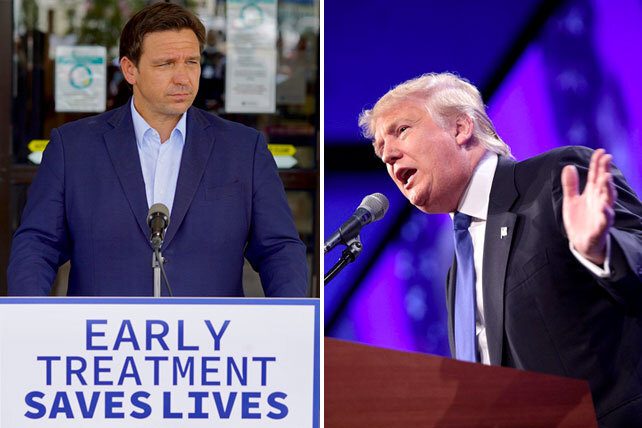Former president Donald Trump was booed at a rally on Aug. 21, 2021, after urging his supporters to get the COVID-19 vaccine. Meanwhile, Florida governor. Ron DeSantis, who has supported getting the vaccine while opposing vaccine mandates, is bringing attention to another type of preventive measure: monoclonal antibody treatment.
“You know what? I believe totally in your freedoms, I do,” said Trump Saturday at a rally in Cullman, Ala. “You got to do what you have to do, but I recommend, take the vaccines. I did it. It’s good.”
Even as he recommended getting the vaccine, the former president downplayed that advice, emphasizing the validity of personal freedom. “Take the vaccines, but you got…” he continued, as the crowd started booing. “No, that’s okay,” he went on, “that’s all right. You got your freedoms. But I happened to take the vaccine. If it doesn’t work, you’ll be the first to know, okay. I’ll call up Alabama and say, ‘Hey, you know what?’ But it is working. But you do have your freedoms….You have to maintain that. And you got to get your kids back to school.”
According to Alabama Public Health (APH), “Data as of August 18, 2021 shows that 89.8% of Alabama’s #COVID19 cases and 94.1% of Alabama’s COVID-19 deaths were in unvaccinated Alabamians. Current data shows that fully vaccinated persons who get COVID-19 are much less likely to get severely ill, go to the hospital, or die from #COVID19.”
Data as of August 18, 2021 shows that 89.8% of Alabama’s #COVID19 cases and 94.1% of Alabama’s COVID-19 deaths were in unvaccinated Alabamians. Current data shows that fully vaccinated persons who get COVID-19 are much less likely… 1/2 pic.twitter.com/5pvplztJFf
— Alabama Public Health (@ALPublicHealth) August 23, 2021
As the U.S. pushes forward with trying to get its population vaccinated while COVID-19 cases surge, another preventive measure is coming to the forefront: monoclonal antibody treatment. The journal “Nature” explains this type of treatment for COVID-19 as follows:
The body’s natural response to viral infection is to generate a variety of antibodies, some of which are able to directly interfere with the virus’s ability to replicate. In the early days of the pandemic, researchers raced to identify the antibodies that are most effective against the coronavirus and to produce them in bulk. The resulting ‘monoclonal antibodies’ have since been tested in a variety of settings as treatments for COVID-19.
Monoclonal antibody treatment is reportedly helpful for keeping COVID-19 symptoms from becoming severe, as well as for preventing the development of the virus in the first place.
A number of states are offering the treatment, and Florida in particular has garnered a high degree of awareness for its efforts.

